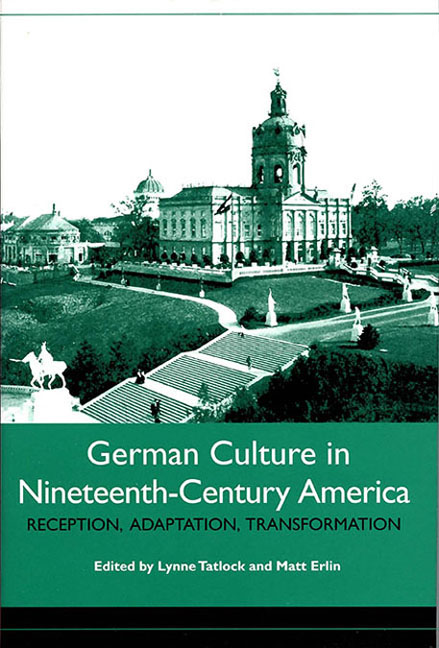Book contents
- Frontmatter
- Contents
- List of Illustrations
- Acknowledgments
- Introduction
- 1 Cultural Politics at the Turn of the Twentieth Century
- 2 In Pursuit of Intellectual Culture
- Absolute Speculation: The St. Louis Hegelians and the Question of American National Identity
- Reading Alexander von Humboldt: Cosmopolitan Naturalist with an American Spirit
- Nietzsche: Socialist, Anarchist, Feminist
- 3 Translation American Style
- 4 Immigration and Naturalization Acts
- Contributors
- Index
Nietzsche: Socialist, Anarchist, Feminist
from 2 - In Pursuit of Intellectual Culture
Published online by Cambridge University Press: 13 April 2017
- Frontmatter
- Contents
- List of Illustrations
- Acknowledgments
- Introduction
- 1 Cultural Politics at the Turn of the Twentieth Century
- 2 In Pursuit of Intellectual Culture
- Absolute Speculation: The St. Louis Hegelians and the Question of American National Identity
- Reading Alexander von Humboldt: Cosmopolitan Naturalist with an American Spirit
- Nietzsche: Socialist, Anarchist, Feminist
- 3 Translation American Style
- 4 Immigration and Naturalization Acts
- Contributors
- Index
Summary
In its ascription of a tripartite personality to Nietzsche, my title recalls the most important book of the American Nietzsche reception, Walter Kaufmann's Nietzsche: Philosopher, Psychologist, Antichrist, which since its publication in 1950 has gone through four editions. Kaufmann's volume was important precisely because it allowed the American public to speak again of Nietzsche after he had been associated for a dozen years with the National Socialists, with war, with anti-Semitism, with immorality and barbarism, and with a system of values inimical to the American and western way of life. Kaufmann's monograph, as well as his many subsequent translations of Nietzsche's writings, removed him from the political sphere and placed him in the role of existential theorist, whose main concerns were being, art, the human mind, and creativity. Kaufmann thereby acted as an important midwife in the birth of Nietzsche as a philosopher, an event that takes place only after the Second World War. Although he was accorded the label of philosopher early on by many readers, he was rarely taken seriously by academic philosophers: in both Germany and the United States his writings were initially more attractive to creative writers and to a general public searching for alternatives to the mainstream bourgeois ethos. He dispensed life wisdom and inspiration, not academic philosophy. The works of Karl Jaspers and Martin Heidegger in German-speaking nations, and of Kaufmann in the Anglophone world, which were all widely promulgated after the war, legitimized Nietzsche's credentials in the world of abstract thought and extricated him from the political fray surrounding his writings in their initial reception. Kaufmann's book thereby represents an overcoming in its own right: Nietzsche was no longer considered the philosopher of the Third Reich — his sister was blamed for doctoring his texts and delivering him into the hands of the far right. Kaufmann assures us that he detested politics and was really apolitical, or even anti-political; he was not anti-Semitic, but anti-anti-Semitic; he was not a supporter of German nationalism, but its most vocal adversary; and any citations from his books that found their way into Nazi propaganda were simply distortions and lies.
- Type
- Chapter
- Information
- German Culture in Nineteenth-Century AmericaReception, Adaptation, Transformation, pp. 129 - 150Publisher: Boydell & BrewerPrint publication year: 2005

